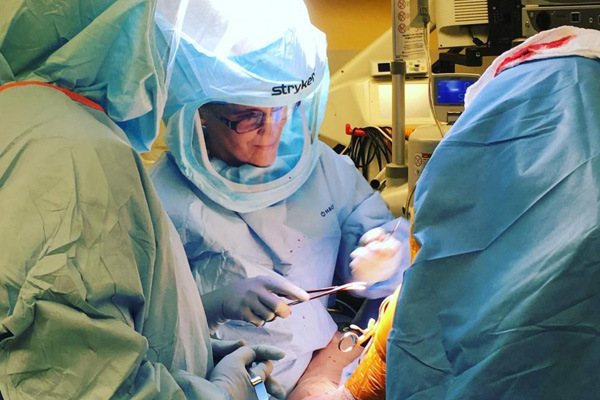
Total Shoulder Replacement: Indications for Surgery
Total shoulder replacement, also known as shoulder arthroplasty, is a highly effective surgical procedure designed to relieve pain and restore function in patients with severe shoulder conditions.
While this procedure can significantly improve quality of life, it is not the first-line treatment and is generally reserved for specific indications when conservative measures have failed. In this blog, we will explore the key conditions and factors that warrant total shoulder replacement.
Understanding Total Shoulder Replacement
In a total shoulder replacement, the damaged parts of the shoulder joint are replaced with prosthetic components. The procedure typically involves:
-
Replacing the humeral head (the ball) with a metal prosthesis.
-
Replacing the glenoid (the socket) with a plastic or polyethylene component.
There are also reverse total shoulder replacements, where the ball and socket components are swapped, providing an alternative solution for certain conditions. The decision to proceed with surgery is based on careful evaluation of the patient’s symptoms, imaging studies, and overall health.
Primary Indications for Total Shoulder Replacement
1. Severe Osteoarthritis (Degenerative Joint Disease)
-
Description: Osteoarthritis is the most common reason for shoulder replacement. Over time, the cartilage that cushions the shoulder joint wears away, leading to bone-on-bone contact, pain, and stiffness.
-
Symptoms: Chronic pain, reduced range of motion, difficulty performing daily activities.
-
When Surgery Is Recommended: When conservative treatments such as physical therapy, anti-inflammatory medications, and corticosteroid injections no longer provide relief.
2. Rheumatoid Arthritis (Inflammatory Arthritis)
-
Description: An autoimmune condition that causes chronic inflammation in the shoulder joint, leading to cartilage destruction and joint deformity.
-
Symptoms: Persistent pain, swelling, joint instability, and limited mobility.
-
When Surgery Is Recommended: When inflammation and joint damage severely impact quality of life despite medical management.
3. Post-Traumatic Arthritis
-
Description: Joint damage caused by a previous shoulder injury, such as fractures, dislocations, or ligament tears, can lead to arthritis.
-
Symptoms: Pain, stiffness, and joint instability following trauma.
-
When Surgery Is Recommended: When prior injuries have resulted in chronic pain and functional limitations.
4. Rotator Cuff Arthropathy
-
Description: Long-term rotator cuff tears can lead to arthritis-like changes in the shoulder joint, known as cuff tear arthropathy.
-
Symptoms: Weakness, pain, and loss of motion, especially overhead.
-
When Surgery Is Recommended: Reverse total shoulder replacement is often the best option for this condition, especially when the rotator cuff cannot be repaired.
5. Avascular Necrosis (Osteonecrosis)
-
Description: A condition where the blood supply to the humeral head is disrupted, leading to bone death and joint collapse.
-
Causes: Trauma, corticosteroid use, excessive alcohol consumption, or medical conditions like sickle cell disease.
-
When Surgery Is Recommended: When the condition causes significant joint destruction and pain.
6. Complex Fractures of the Proximal Humerus
-
Description: Severe fractures that involve the humeral head may be difficult to repair, particularly in older adults with poor bone quality.
-
When Surgery Is Recommended: Total shoulder replacement may be considered when fracture fixation is unlikely to restore function.
What Are the Alternatives to Surgery?
Before considering surgery, most patients try conservative treatments, including:
-
Physical Therapy: Focused on strengthening the shoulder muscles and improving range of motion.
-
Medications: Nonsteroidal anti-inflammatory drugs (NSAIDs) and corticosteroid injections.
-
Activity Modifications: Avoiding movements that exacerbate pain.
These treatments are often effective in the early stages of joint disease but may become less effective as the condition progresses.
Conclusion
Total shoulder replacement is a life-changing procedure for individuals suffering from debilitating shoulder conditions. While it’s a powerful solution for severe pain and loss of function, it’s essential to ensure the timing and indications are appropriate. Consulting with an experienced orthopaedic surgeon is the first step toward determining the best course of action. With the right care, patients can regain mobility and enjoy a pain-free life.
If you’re experiencing chronic shoulder pain, don’t wait. Schedule a consultation to explore your options and take the first step toward recovery.






